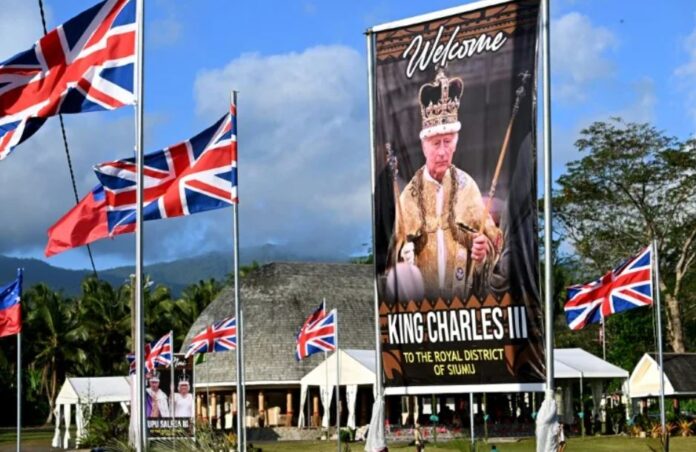Apia, Samoa: King Charles III touched down in Samoa on Wednesday to attend his first Commonwealth summit as monarch, hoping to invigorate a group of nations some critics see as “a leftover of empire.” His arrival in the coastal capital of Apia follows a brief, scaled-back visit to Australia, trimmed due to his recent cancer diagnosis.
The biennial summit of the 56-member Commonwealth, largely composed of former British colonies, will draw around 3,000 delegates. This marks the first time the event is being hosted by a Pacific Island nation, a significant milestone in the region’s history. Commonwealth Secretary-General Patricia Scotland called the gathering an “extraordinary” chance to highlight the Pacific and reinforce the unity of the Commonwealth amid an increasingly complex global landscape.
“We face a troubled and complex future,” Scotland said. “We can either swim together or drown separately. The Commonwealth has always chosen to fight, not to drown.”
Focus on Climate Change
A central topic of the summit is climate change, particularly the threat posed by rising sea levels—an issue that deeply affects the Pacific Islands. With 70% of Samoa’s population living in low-lying coastal areas, the country is on the frontlines of what Secretary-General Scotland called an “existential threat” to the region.
Once famed for their pristine beauty, many Pacific islands now struggle against the rising tide of climate change, making Samoa an ideal location to spotlight these urgent environmental issues. The nation has spent months preparing for the summit, including upgrading infrastructure and conducting a safety campaign to collect illegal firearms.
Samoan residents are eager to showcase their island’s hospitality, with one local, Mata’afa Keni Lesa, expressing his excitement to welcome world leaders and visitors.
Commonwealth’s Role in a Changing World
Though some critics question the Commonwealth’s relevance in the post-colonial era, King Charles and Secretary-General Scotland argue that the bloc remains a vital player on the global stage. In 2022, the Commonwealth expanded to include Gabon and Togo—both former French colonies—demonstrating its ongoing appeal.
King Charles underscored the bloc’s significance during a speech in Canberra earlier this week, saying, “The Commonwealth has the diversity to understand the world’s problems and the brain power to formulate practical solutions.”
The summit offers member nations a rare opportunity to engage in dialogue free from the “geostrategic anxiety or competition” that often characterizes global forums, according to Tess Newton Cain of Griffith University’s Asia Institute. She noted a sense of relief that neither the U.S. nor China would dominate discussions.
Legacy of Empire and Future Leadership
Despite efforts to shed its colonial past, the Commonwealth still grapples with the legacy of empire, particularly as leaders are set to choose a new secretary-general from Africa. Three candidates—Joshua Setipa from Lesotho, Shirley Ayorkor Botchwey from Ghana, and Mamadou Tangara from the Gambia—are vying for the position. Each has publicly supported reparations for slavery and colonialism.
Setipa, one of the frontrunners, emphasized the need for a solution that goes beyond mere financial compensation. He advocates for funding to help nations adapt to climate change, linking the need for reparations to modern-day challenges.
“We must address the injustices of the past in the context of what is happening today,” Setipa said, suggesting that reparations could unite both developed and developing nations in a common cause.
As the summit unfolds, leaders will navigate these historical and contemporary issues, with climate change, economic resilience, and the future direction of the Commonwealth at the forefront.



